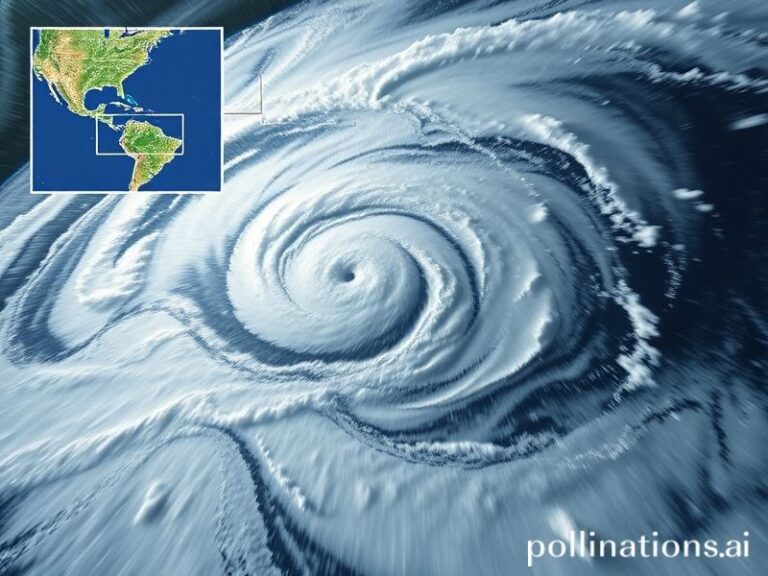Virginia Giuffre: The Woman Who Made the World Check Its Private-Jet Morality at the Gate
Virginia Giuffre and the Cosmic Irony of Justice in the Age of Private Jets
By our correspondent in the departure lounge of moral bankruptcy
The name Virginia Giuffre still rattles around the world’s chanceries like an unclaimed diplomatic bag: too hot to open, too toxic to lose. From Canberra to Abu Dhabi, her story has become a multinational Rorschach test in which every capital city sees the blot it most fears. Australia, her adopted home, spent years airbrushing her passport photo from the national family album; the United Kingdom, birthplace of so many august institutions now practicing yoga-level contortions of denial, pretends the scandal is strictly “historical,” like the Corn Laws or decent rail service. Meanwhile, the United States—the land that gave us both the Constitution and the private-island NDA—continues to treat the whole affair as a regrettable clerical error in the HR file of the 1%.
Giuffre’s civil suit against Prince Andrew (settled 2022 for a sum rumored to be larger than the GDP of Micronesia) was never just about one allegedly sweaty royal palm on one teenager’s waist. It was a stress test for the entire global VIP firewall: the unspoken agreement that if you fly high enough, gravity becomes optional. The settlement arrived with the usual choreography—no admission of liability, a donation to Giuffre’s charity, and a joint statement so anodyne it could have been ghost-written by a PR algorithm trained on Hallmark sympathy cards. Justice, in the end, was served à la carte, with the house dressing.
But the ripple effects keep sloshing against distant shores. In France, where liberté is apparently divisible by the size of your yacht, officials quietly shelved an investigation into modeling-agency procurement networks, citing “insufficient evidence” and—one suspects—sufficient embarrassment. Israel, ever vigilant about passports, revoked the citizenship of one former prime ministerial buddy faster than you can say “diplomatic immunity.” And in the Virgin Islands—those charming dots on the map where U.S. law applies only on alternate Tuesdays—prosecutors continue to play whack-a-mole with shell companies that keep popping up like tax-avoiding meerkats.
The broader significance, of course, is that Giuffre forced the planet to confront an uncomfortable truth: the same supply chains that deliver quinoa to Soho brunch tables also traffic in teenagers. The private jet, that modern icon of cosmopolitan mobility, turns out to be remarkably effective at moving more than just influencers and their emotional-support Labradoodles. One flight manifest can link a Manhattan hedge-fund gala to a Riyadh “investment conference” to a Caribbean beach barbecue faster than you can say “extradition treaty.”
International law, meanwhile, remains the legislative equivalent of a rotary phone: charmingly vintage, hopelessly inadequate. Treaties written in the era of steamships now attempt to regulate encrypted messaging apps and islands leased through a Cayman Islands subsidiary of a Delaware LLC. The result is a jurisdictional funhouse where every mirror reflects the same message: “Not our problem.”
And yet, for all the cynicism baked into the system, Giuffre’s persistence has produced the rarest of commodities: consequences. Banks in Zurich—those bastions of numbered discretion—have quietly closed accounts tied to Epstein’s circle. Universities from MIT to Edinburgh have scurried to rename lecture halls they once christened with donor plaques the size of small billboards. Even the Vatican, never quick to blush, has reportedly added “private island ownership” to its internal risk checklist, somewhere between embezzlement and liturgical dance.
In the end, Virginia Giuffre’s story is less a morality play than a geopolitical farce, a reminder that in the global marketplace of influence, innocence is just another commodity—price negotiable, delivery discreet. The next time you recline your lie-flat seat at 40,000 feet, spare a thought for the invisible cargo that once shared the cargo hold: the paperwork, the hush money, the unreturned text messages. The jet stream connects us all, whether we like the itinerary or not.







